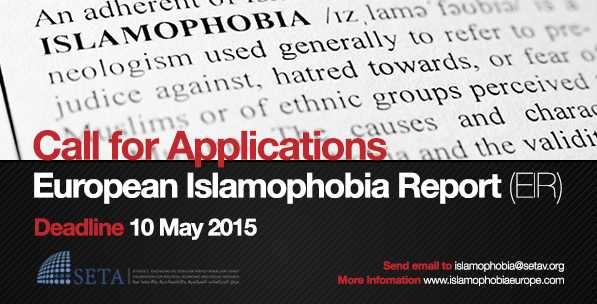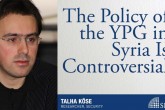The aim of the yearly ‘European Islamophobia Report’ (EIR) is to document and analyze trends in the spread of Islamophobia in various European nation states. Every year at the beginning of February before the International Day for the Elimination of Racial Discrimination (21 March), reports will be published online and hardcopy and disseminated among leading stakeholders, politicians, NGO’s, and anti-racist organizations.
EIR will be authored by leading experts in the field of Islamophobia Studies and/or NGO-activists committed to the documentation of racism in respective nation states. One person will author one report of his/her country of expertise. These reports will be also published online to be easily accessible. The full report will also be translated into Turkish. The executive office will disseminate the reports among key policy makers, journalists and NGO activists from the local, national and European level. A recommended structure for a national report is to contain the following chapters:
- Executive Summary in native language and in English
- Table of Contents
- Introduction
- Significant incidents and developments in the country during the period under review
- Discussion of Islamophobic incidents and discursive events in various fields:
- Employment; have there been any discrimination in the job market based on (assumed) Muslimness of a person?
- Education; has Islamophobic content become part of any curricula, text books, or any other education material?
- Politics; has Islamophobia played any role in politics (election campaigns, political programs, personal utterings, etc.) on a regional or national level?
- Media; which media events have focused on Islam/Muslims in an Islamophobic way?
- Justice System; have there been any laws and regulations argued with Islamophobic arguments or any laws restricting the rights of Muslims in their religious lifestyle?
- Cyber-Space; which webpages and initiatives have spread Islamophobic stereotypes?
- Central Figures in the Islamophobia Network; which institutions and persons have fostered Islamophobic campaigns, stirred up debates, lobbied for laws, etc.
- Observed civil society and political assessment and initiatives undertaken to counter Islamophobia in the idem fields
- Conclusion: Policy Recommendations for politics and NGO’s
- Chronology
- CV
It is recommended to collect information via (critically) analyzing media reports, contacting offices and NGO’s who combat discrimination, doing expert interviews with leading scholars and policy makers in the field.
Language: English.
Dissemination: Reports will be accessible online via an extra web-page for the project. In addition, all reports will be translated into Turkish and published online and in print.
Countries:
Long report (6.000 words): Austria, Belgium, Bulgaria, France, Germany, Greece, Italy, Netherlands, Spain, Switzerland, United Kingdom, Russia, Bosnia Herzogovina, Norway, Sweden, Finland.
Short report (3.000 words): Croatia, Serbia, Czech Republic, Hungary, Lithuania, Estonia, Latvia, Poland, Portugal, Romania, Slovakia, Slovenia, Albania, Macedonia, Montenegro, Kosovo
Professional fee:
– 1.000 € for a long report
– 500 € for a short report
Deadlines:
Call for Applications until: 10 May 2015.
Application should entail:
- CV
- Expertise in the field of racism studies, including Islamophobia Studies (list of publications)
- List of NGO’s in the country, with whom one would cooperate to get information



